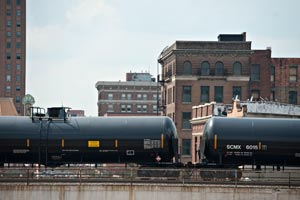As Another Oil Train Derails, Regulators, Lawmakers Say Progress Being Made

Three years ago July 6, an unattended train carrying crude oil from North Dakota rolled down a hill toward the town of Lac-Megantic, Quebec.
The 74-car freight train derailed near the center of town, and the ensuing explosion and fire killed 47 people and destroyed much of the downtown core, a government report later said.
That disaster, along with other, less deadly derailments and explosions, put a spotlight on the practice of transporting crude oil by rail and helped prompt lawmakers and regulators to put in place new tank car specifications and hire rail inspectors. And while some said new rules will make transporting hazardous materials safer, those trains continue to leave the tracks.
Residents of Mosier, Oregon, were forced to evacuate in early June after tanker cars carrying Bakken crude derailed and caught fire. No injuries were reported.
Mosier Mayor Arlene Burns said it's too dangerous to move crude oil by trains. She's also concerned about the larger issue of fossil fuels' effect on the environment.
"We feel vulnerable," Burns told the Herald. "A lot of people want to move to another place."
While less black gold is moved on trains out of North Dakota today than just a couple of years ago, lawmakers and regulators don't expect oil trains to go away. Trains had become a go-to mode of transportation during the rapid rise in oil production in the Bakken region.
Brigham McCown, a former administrator of the Pipeline and Hazardous Materials Safety Administration, said calls to remove Bakken crude oil from trains are "unrealistic."
"It's a legal commodity," he said. "We transport lots of items, lots of different hazardous material items by rail, and crude oil is ... nowhere close to the most volatile type of chemical or products that we ship by rail."
And even with new rules and programs in place, officials acknowledge it's impossible to prevent every incident. Sen. John Hoeven (R-N.D) said "no system is perfect" and advocated for efforts to mitigate damage in the case of derailment.
"If perfection is the goal, I don't think we're likely to reach the goal," Rep. Kevin Cramer (R-N.D) said. "But clearly there's been progress made."
The amount of North Dakota oil moved by trains grew sharply after 2010, during the height of the Bakken oil boom. As much as 847,362 barrels were exported out of the Williston Basin per day in December 2014, up from fewer than 100,000 barrels per day in September 2011, according to North Dakota Pipeline Authority data.
Industry officials have said pipeline capacity failed to keep up with the unprecedented boom in oil production, leaving trains to pick up the slack. But the amount of oil moved on the tracks has dropped over the past year, and the North Dakota Pipeline Authority estimates as many as 393,182 barrels of oil moved out of the Williston Basin on trains daily in April.
Justin Kringstad, director of the pipeline authority, said lower production is one factor in that change. But he said a narrowing spread between two leading price benchmarks of crude oil also means there's less incentive for coastal refineries to pay the rail transportation costs for Bakken crude.
BNSF spokeswoman Amy McBeth called freight rail "one of the safest ways to transport crude oil and hazardous materials," adding the Forth Worth, Texas-based company has reduced its mainline derailments by nearly 50% in the past 10 years. She said BNSF also has increased track inspections on its crude oil routes beyond what is required by the federal government, reduced train speeds and provided training to first responders.
First responder training programs came in handy during another derailment that caused the evacuation of the small town of Heimdal, North Dakota, in May 2015.
"We felt that we were quite prepared," Harvey, North Dakota, Fire Chief David Lautt said. "Our training was very valuable to us for that event."
Lautt said officials from his department received training in New Rockford, North Dakota, about half a year before the Heimdal derailment and a couple of firefighters went to Pueblo, Colorado, for emergency response training. Harvey officials also were planning a mock derailment when the Heimdal incident occurred.
Still, Lautt said they got "pretty dang lucky" in Heimdal because it didn't happen in the middle of a town.
Sen. Heidi Heitkamp (D-N.D) is pushing a bill that would establish a council of emergency responders, federal agencies and experts to "review training and best practices for first responders" and provide Congress with recommendations, according to a news release. The bill passed the Senate in May.
"Those volunteer firefighters need to have the training so they don't get hurt, so that they respond to these incidents appropriately," Heitkamp said.
Maybe the most significant recent piece of regulation on rail transportation of hazardous material came last year.
That rule, issued by the Pipeline and Hazardous Materials Safety Administration and the Federal Railroad Administration, seeks to phase in stronger tank cars, restrict speeds for "high-hazard flammable trains" and require enhanced braking systems.
The deadlines to phase in stronger tank cars are spread out over the next nine years. The first U.S. deadline comes Jan. 1, 2018, when non-jacketed DOT-111 cars no longer will be allowed to carry crude oil or ethanol.
By 2025, all tank cars carrying crude oil and ethanol will include jackets, thermal protections, enhanced valves and other features, according to the Railway Supply Institute.
"We are committed to meeting the deadlines in the rule," RSI President Tom Simpson said.
American Railroad Association spokesman Ed Greenberg said about 10,000 new or retrofitted tank cars are in crude oil service today.
While McCown said regulators are moving in the right direction, he added that the Department of Transportation and the rail industry should pay more attention to preventing accidents.
"It's not the commodity that's causing the accidents," he said. "The infrastructure is not holding up."


